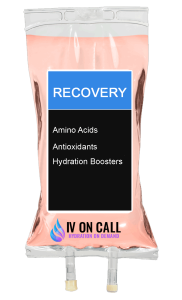This IV infusion, often marketed as a "Recovery" or "Performance Recovery" treatment, combines amino acids, antioxidants, and hydration-enhancing components. It's typically promoted to aid in physical recovery after intense exercise, illness, or other stressful events on the body. While these components have known physiological roles, the efficacy and necessity of administering them intravenously for general recovery purposes are subjects of ongoing research in the medical community.

1. Amino Acids
Specific amino acids may vary but often include:
a. Glutamine
- Function: Supports immune function and gut health; important for muscle recovery
- Typical IV dose: 0.5-0.75 g/kg body weight
- Considerations:
- May help reduce muscle soreness and improve recovery in athletes
- Generally considered safe, but high doses may cause gastrointestinal discomfort
b. Branched-Chain Amino Acids (BCAAs: Leucine, Isoleucine, Valine)
- Function: Essential for protein synthesis and muscle recovery
- Typical IV dose: 250-500 mg of each BCAA
- Considerations:
- May help reduce muscle damage and promote muscle protein synthesis
- Effectiveness of IV versus oral administration is not well-established
2. Antioxidants
May include:
a. Vitamin C
- Function: Powerful antioxidant; supports collagen synthesis and immune function
- Typical IV dose: 1-2 g
- Considerations:
- May help reduce oxidative stress and inflammation associated with intense exercise
- High doses can cause gastrointestinal side effects in some individuals
b. Glutathione
- Function: Master antioxidant; supports detoxification processes
- Typical IV dose: 600-1200 mg
- Considerations:
- May help reduce oxidative damage and support liver function
- Effectiveness of IV versus oral administration is debated in scientific literature
3. Hydration Boosters
May include:
a. Electrolytes (Sodium, Potassium, Magnesium)
- Function: Essential for proper hydration and cellular function
- Typical IV dose: Varies based on the specific electrolyte solution used
- Considerations:
- Crucial for rehydration, especially after intense sweating
- Must be carefully balanced to avoid electrolyte imbalances
b. B-Complex Vitamins
- Function: Support energy metabolism and cellular function
- Typical IV dose: Varies by specific B vitamins
- Considerations:
- May help with energy production and recovery
- Generally considered safe, but high doses can cause side effects like skin flushing
- Accelerated physical recovery after intense exercise
- Reduced muscle soreness and fatigue
- Enhanced hydration
- Improved energy levels
- Antioxidant support to combat exercise-induced oxidative stress
- Support for immune function during periods of high physical stress
- Typically administered in medical clinics, sports medicine facilities, or by healthcare providers
- Usually given as an IV drip over 30-60 minutes
- May be recommended as a single treatment or a series, often tailored to an individual's training or competition schedule
I am text block. Click edit button to change this text. Lorem ipsum dolor sit amet, consectetur ad
- Efficacy:
- While individual components have known roles in recovery and hydration, evidence for the efficacy of this specific IV combination in enhancing recovery is limited
- Most studies on IV hydration and nutrient supplementation for athletes show mixed results
- Safety concerns:
- Risk of infection at injection site or in bloodstream
- Potential for allergic reactions
- Possibility of vein irritation or damage
- Risk of fluid overload in susceptible individuals
- Interactions and Contraindications:
- May interact with certain medications
- Not suitable for individuals with certain medical conditions, particularly kidney or heart issues
- Careful consideration needed for athletes subject to anti-doping regulations
ipiscing elit. Ut elit tellus, luctus nec ullamcorper mattis, pulvinar dapibus leo.
- Headache, nausea, or dizziness (often temporary)
- Vein inflammation or bruising at injection site
- Allergic reactions (rare but possible)
- Electrolyte imbalances if administered incorrectly
- Potential for overhydration if not properly monitored
- Proper nutrition and hydration through oral intake
- Adequate rest and sleep
- Active recovery techniques (e.g., light exercise, stretching)
- Compression garments
- Massage and other physical therapies
- Gradual training progression to improve natural recovery capacity
While the components of this Recovery IV infusion are known to play important roles in physical recovery and hydration, the scientific evidence supporting its use as a combined IV therapy for general recovery enhancement is limited. The necessity of IV administration for these nutrients in individuals without specific deficiencies or medical indications is questionable. Athletes and individuals considering this treatment should consult with qualified healthcare providers, ideally those with expertise in sports medicine, to discuss potential benefits, risks, and evidence-based alternatives based on their specific health status, training regimen, and recovery needs.
